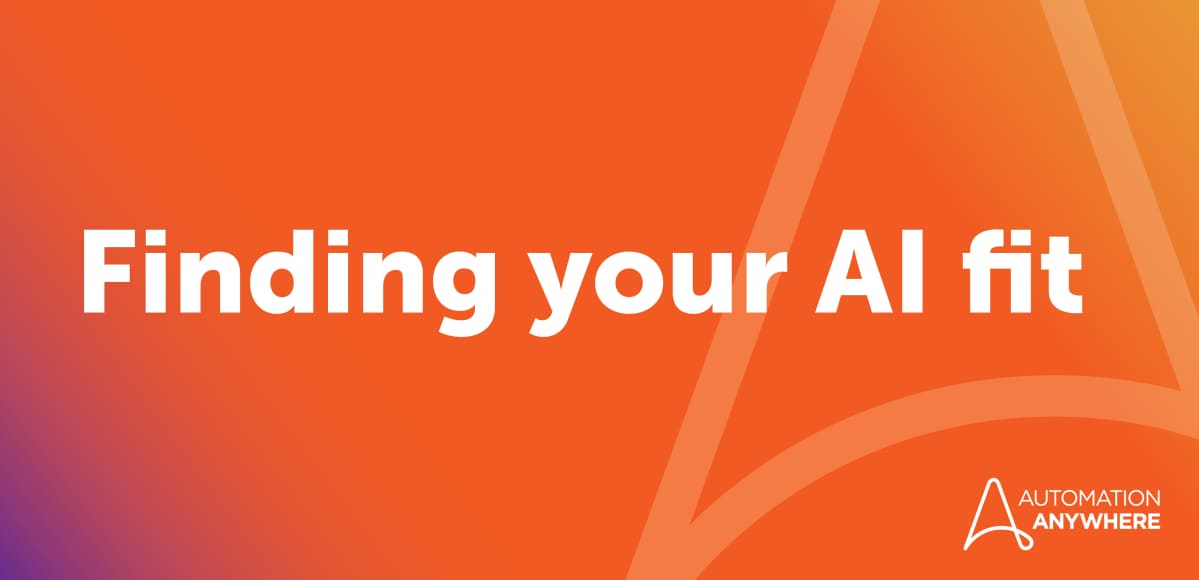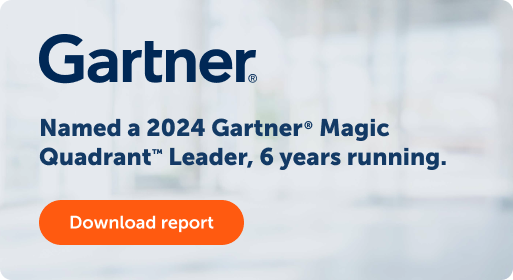- Products
Automate any process, anywhere Streamline complex, mission-critical workflows with the Agentic Process Automation System. Explore the Platform Explore the Platform
- AI System
- Build AI Agents
Automate advanced tasks with AI Agent Studio.
- Streamline workflows
Rapidly design and deploy with Automator AI.
- Process complex documents
Extract and organize data with Document Automation.
- Discover opportunities
Identify inefficiencies with Process Discovery.
- Orchestrate automations
Centralize initiatives with Automation Workspace.
- Build AI Agents
- Automation System
- Govern programs
Establish frameworks and oversight with CoE Manager.
- Automate from any app
Get AI-powered assistance with Automation Co-Pilot.
- Speed workflows with cloud
Power instant data exchange with serverless Automation Anywhere Cloud Service
- Unify systems
Connect applications and workflows with seamless integrations.
- Govern programs
- View all Products
-
- Solutions
Featured Solutions
 Google Cloud Google Cloud and Automation Anywhere empower enterprises to fast-track their AI + Automation journey. Google Cloud
Google Cloud Google Cloud and Automation Anywhere empower enterprises to fast-track their AI + Automation journey. Google Cloud Amazon Web Services Streamline workflows, reduce costs, and make automating even easier when you combine the Agentic Process Automation System with AWS Amazon Web Services
Amazon Web Services Streamline workflows, reduce costs, and make automating even easier when you combine the Agentic Process Automation System with AWS Amazon Web Services- By Industry
- By Function
- By Technology
- View all AI Solutions
-
- Resources
Get Community Edition: Start automating instantly with FREE access to full-featured automation with Cloud Community Edition.
Featured
 Named a 2024 Gartner® Magic Quadrant™ Leader for Automation. Celebrating Six Years of Recognition as a Leader. Download report Download report
Named a 2024 Gartner® Magic Quadrant™ Leader for Automation. Celebrating Six Years of Recognition as a Leader. Download report Download report - Customers
New & improved certifications
 Give yourself a competitive advantage with Automation Anywhere's industry-recognized certifications.Explore Certifications Explore Certifications
Give yourself a competitive advantage with Automation Anywhere's industry-recognized certifications.Explore Certifications Explore Certifications - Company
Get in touch with us Get help, know more, learn, ask questions, or just say Hi! Contact Us Contact Us
- Get To Know Us
- Announcements
- Society
-
Blog
How to Choose the Right AI Agent Solution for Your Business

Adding AI—or at least claiming to—has quickly become standard practice. Why? AI is undeniably valuable, and generative AI, in particular, holds immense economic potential. For organizations, personal AI tools that tap into the power of large language models (LLMs) have generated a lot of excitement. Now organizations are asking what happens next—how can you scale AI-driven productivity enterprise-wide?
Personal vs. enterprise AI tools
As organizations evaluate AI solutions, a key distinction is emerging between personal AI tools and enterprise-grade solutions. Personal AI tools deliver case-by-case productivity boosts at work—one person at a time can apply the power of AI to speed up tasks like summarizing meeting notes or writing emails. But the workflow is primarily text-in, text-out, and remains siloed to the actions and processes of individual employees.
Enterprise technology needs and considerations are quite different from those of individuals. For starters, while security is, of course, still an important factor for individuals, it is a vastly more complex and risk-riddled landscape for business operations. The reality is that evaluating enterprise technology must go far beyond the immediate feature set that will service the business case or task at hand. It’s essential to also consider factors like systems integration, deployment models, data warehousing, scalability, and compliance requirements.
Given these enterprise requirements, organizations are increasingly looking beyond basic AI tools toward more sophisticated solutions—specifically, AI agents that can be deeply integrated into business processes.
Adding AI to the mix brings a whole new set of considerations to the table. But don't let that dissuade you. In this article, I want to provide some perspective on the value of AI—specifically in the form of AI agents—waiting to be tapped into at the enterprise level and offer guidance on how to choose an AI agent software provider that will enable you to capitalize on their immense potential.
First, what is the AI agent difference?
To address these enterprise needs while capitalizing on AI's potential, a new category of solution has emerged: AI agents. But what makes these different from conventional AI tools?
Enterprise AI agents in agentic processes differ from personal AI assistants in their ability to deliver cross-functional and complete start-to-finish transformation for businesses. They can drive significant increases in revenue or reductions in cost for critical business processes versus simply making employees 10% more productive in some existing daily tasks.
This process-level impact has another element to its value, too: Scale. While personal AI tools are useful at the one-off task level, embedding AI agents within enterprise workflows delivers impact across the dozens (if not hundreds or even thousands) of process touchpoints throughout the organization. Just think of the sheer number of people involved, both internally and externally, throughout processes in enterprise functions like supply chain or service operations.
That’s not to say AI agents aren’t helpful at the individual level. On the contrary, enterprise AI agents can work cooperatively and collaboratively with human teams by handling adjacent workflows or data analysis to augment human-driven work. For example, in a service operations setting, AI agents can accelerate human agent effectiveness by surfacing expert-level knowledge and workflow assistance relevant to the call or task—and personalized to the customer.
Key criteria for evaluating AI agent solutions
Until very recently, building AI agents wasn’t a question of software at all; it required custom code development from AI experts. Times have (quickly) changed: Today, a growing landscape of software companies claims to offer off-the-shelf agentic solutions with varying degrees of readiness for businesses.
That is to say, not all agentic solutions are created equal. Creating and effectively harnessing the value of AI agents requires selecting a platform designed for both the depth of enterprise software requirements and the breadth of capabilities of AI agents.
In particular, enterprises need a solution that supports orchestrating AI agents within business process automations and makes creating custom AI agents quick and straightforward for automation teams regardless of their level of experience with AI.
And that’s what this list of capabilities and criteria is for—to help inform your journey in finding and selecting the right AI agent platform for your enterprise needs.
Builder experience
The builder or developer experience is a central factor in selecting an agentic automation solution because it directly influences the efficiency, scalability, and adaptability of projects. A user-friendly and intuitive interface minimizes the learning curve and reduces development time. This contributes to program momentum as it shortens the runway for deployment and subsequent iterations/adjustments.
And, while it might go without saying, a positive builder experience encourages collaboration, innovation, and the adoption of best practices, all leading to more robust and resilient agents.
Low-code agent creation
Building AI agents should not require data science expertise. Look for solutions that empower developers and even business users with templates and a low-code workspace to build AI agents. Without requiring advanced knowledge, an intuitive agent creation workflow will allow you to select any foundation model quickly, connect to enterprise data, tune prompts, connect to action, and—importantly—easily add human-in-the-loop.
AI skills
AI agents can be made with specific skills to execute business tasks. Skills represent sets of optimized prompts and models that are linked together to ensure a task is completed according to prescribed guidelines, such as whether a request meets specific policy requirements. Look for platforms that enable packaging up sets of reusable AI skills so they can be applied whenever needed, streamlining and accelerating new agent development.
AI choice and flexibility
Selecting the right LLM is a significant factor in designing effective AI agents and further differentiates them from personal AI tools, which do not offer—or significantly limit—model choice.
Connecting the right LLM for each enterprise use case and then grounding in enterprise knowledge enables agents to match the way your business operates for better results, faster. Effective solutions will connect with any LLM while providing a curated list of enterprise-ready models and will enable customization based on enterprise data.
Enterprise integrations
AI agents need to connect to enterprise applications to get work done. This is one of the top reasons that combining them with automation is so powerful in enabling action; embedding agents within automation enables the execution of cognitive tasks at scale within the integration framework already provided by the automation platform.
Look for AI agent software that connects with any and every enterprise app. Evaluate solutions for integration flexibility via open architecture paired with robust platform security and governance capabilities.
Cloud automation execution
The benefits of cloud-based architecture have been available for some time, but many are still out of reach from AI and automation providers. Beyond ensuring that you can deploy across any public or private cloud, look for the ability to execute agentic workflows themselves in the cloud. This approach leverages APIs to deliver fast data access for instant responses.
With zero on-premise costs thanks to a serverless, cloud-based approach, the benefits include reduced expenses, elastic scalability, faster performance, and enhanced resilience.
Governance
Full visibility into every AI activity and response is necessary to enforce responsible AI policies. Governance ensures that AI agents operate within defined ethical, legal, and organizational boundaries, mitigating risks such as bias, data breaches, and unintended consequences.
By establishing clear guidelines and monitoring AI interactions, organizations can maintain control over AI behaviors, ensuring compliance with regulatory standards and safeguarding data integrity. This structured oversight not only builds trust but also enhances the reliability and accountability of AI deployments, ultimately supporting long-term adoption and AI integration into business processes.
Enterprise solutions will enable you to set guardrails for consistent use and human validation, review content within prompts and model responses for sensitivity and relevance, and monitor and audit both agent and model performance. Look for solutions that protect company data with data masking capabilities and data privacy controls. Logs and analytics for both prompts and model responses should feed insights into model performance and accuracy.
Orchestration
AI agents become even more powerful when working together as a coordinated team within end-to-end business processes. Advanced Agentic Process Automation systems already offer this orchestration capability, enabling complex agentic automation across multiple processes and functions.
To maximize value from AI agents, ensure your chosen solution provides both multi-agent orchestration and supports seamless human-agent collaboration.
Multi-agent orchestration
Look for robust process orchestration tools and multi-agent orchestration features, including comprehensive task automation and scheduling with real-time monitoring and analytics.
Agent and human collaboration
Individual users should be able to easily access and guide AI agents in executing complex tasks. Look for solutions that seamlessly surface agent-powered automation to business users through automation assistants, enabling access to relevant agentic processes and task management. Evaluate solutions for how effectively they provide this accessibility and usability for business users.
Getting started
With these criteria in mind, organizations can confidently evaluate and select the right AI agent platform for their needs. At Automation Anywhere, we're dedicated to empowering organizations to safely and effectively unlock AI's potential. Our latest advancements focus on deploying AI agents within enterprise environments. Our Agentic Process Automation System is designed to make the power and value of AI accessible with practical tools to build AI agents and integrate them into enterprise automations. AI Agent Studio, our standard-setting product for agent creation, and Automator AI, powering rapid agentic automation development, are just two top-level examples of tools available within our AI-first enterprise automation platform.
We’re excited to work together with you to bring the power of agentic automation to your organization. Connect with us anytime with your questions, and feel free to request a demo to get started.
About Peter White

Peter White is the SVP of Emerging Products at Automation Anywhere.
Subscribe via Email View All Posts LinkedInGet to know the Agentic Process Automation System.

For Students & Developers
Start automating instantly with FREE access to full-featured automation with Cloud Community Edition.



